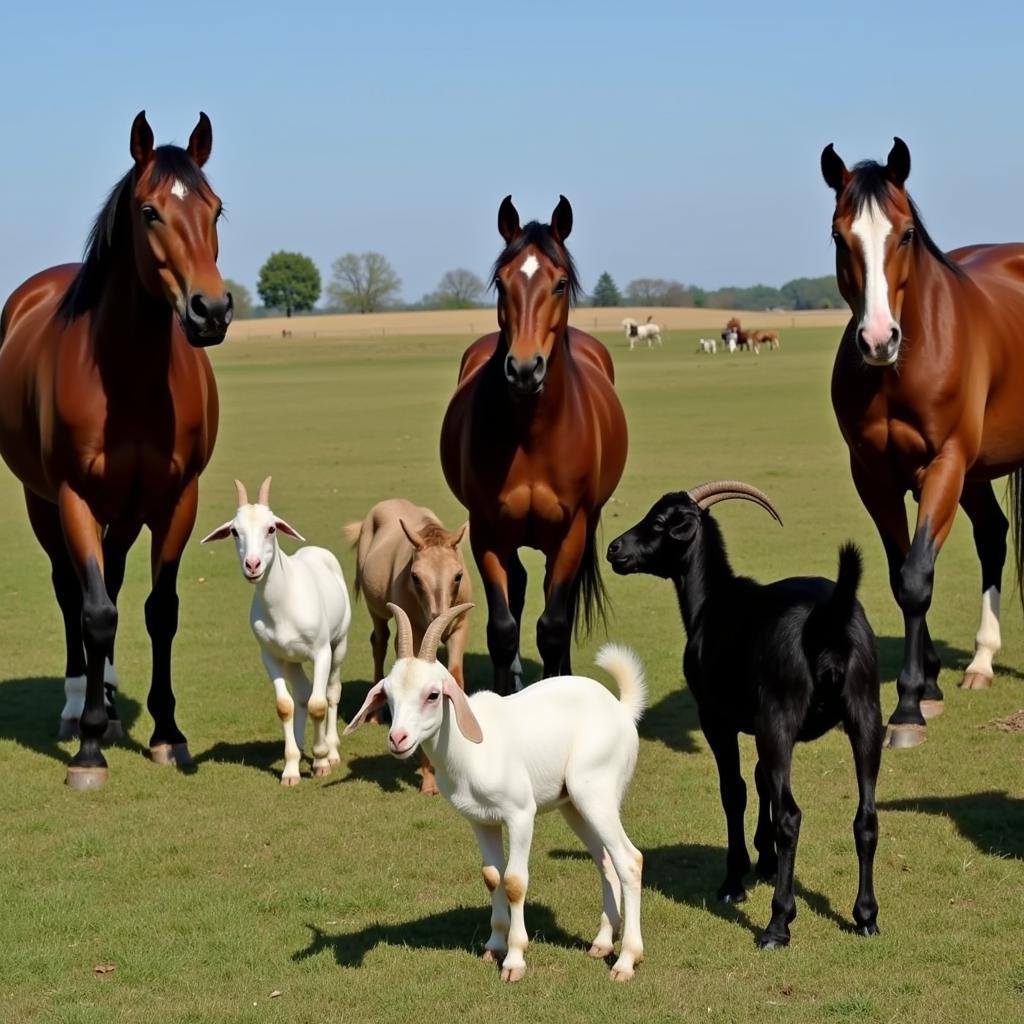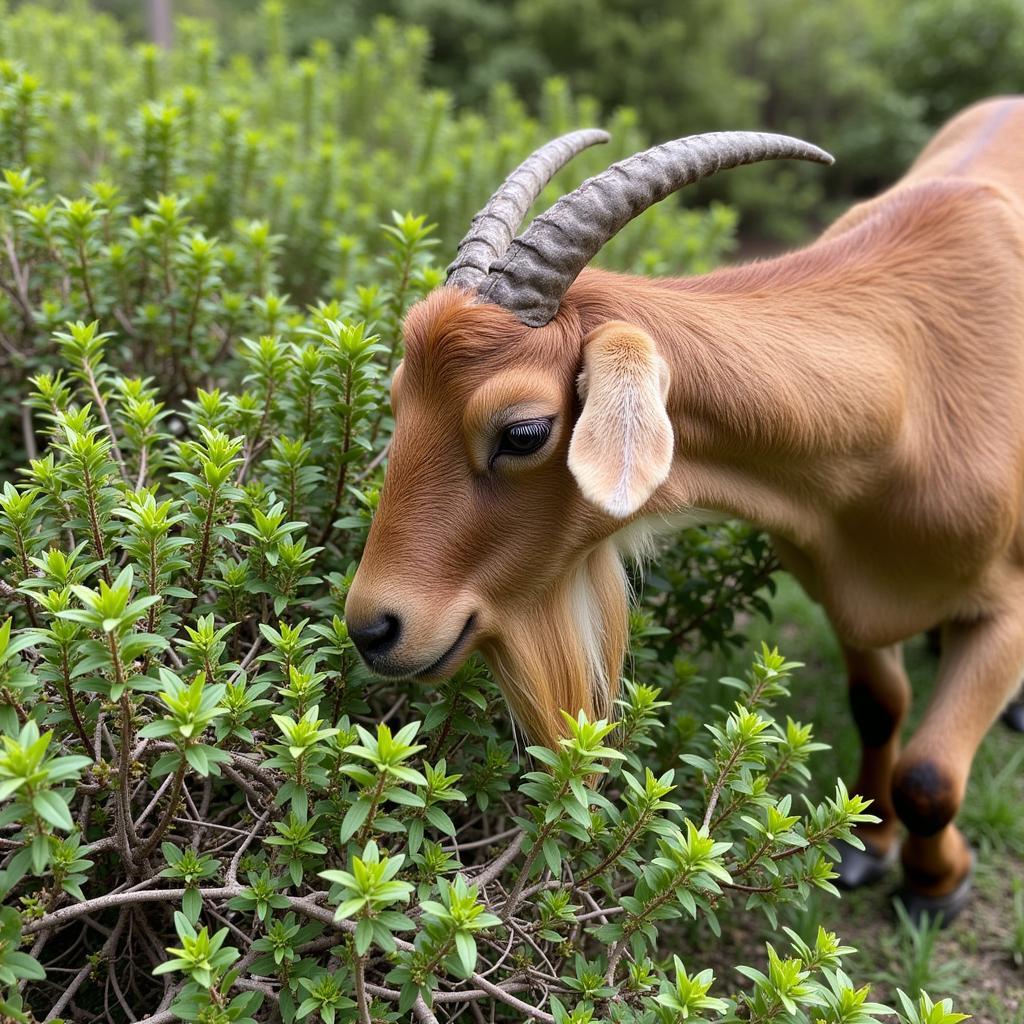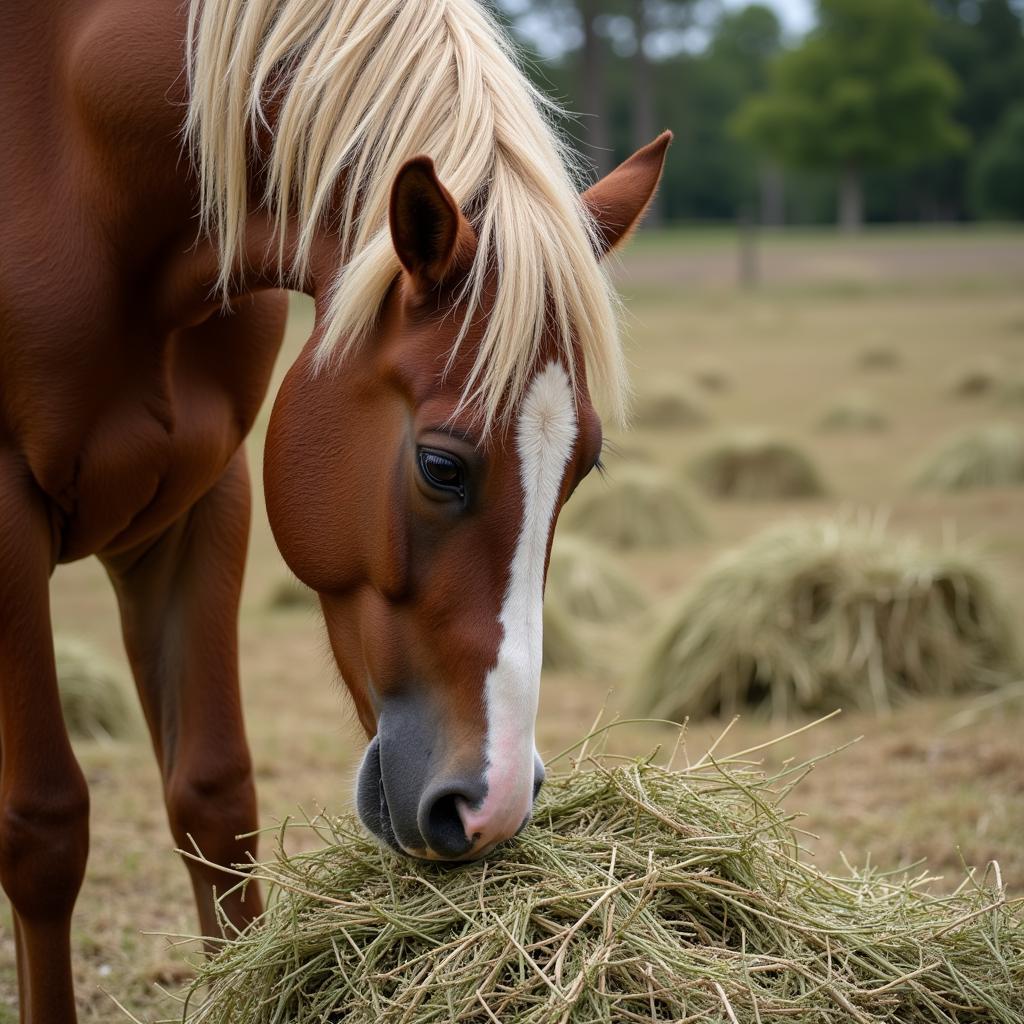Goats And Horses, while both hoofed and herbivorous, have distinct needs and personalities. Understanding these differences is crucial for anyone considering keeping them together, or even separately, as informed care is essential for their well-being. This guide will delve into the nuances of goat and horse management, exploring their compatibility, dietary requirements, housing needs, and overall care.
Can Goats and Horses Live Together?
The question of whether goats and horses can coexist peacefully is a complex one. While some individuals have found success in integrating these two species, it’s not a guaranteed harmonious arrangement. Horses, being prey animals, can sometimes be intimidated or even injured by the playful, and occasionally boisterous, nature of goats. Conversely, goats, known for their curiosity and nibbling habits, might inadvertently ingest horse medications or feed, which can be toxic to them. Careful introduction and constant supervision are paramount. Providing separate feeding and sleeping areas can minimize potential conflicts.
A successful mixed-species herd often relies on the individual personalities of the animals involved. A docile horse might tolerate a playful goat, while a more anxious horse might find the goat’s presence stressful. Similarly, a dominant goat could bully a submissive horse, creating an unhealthy dynamic.
After the introduction phase, continuous monitoring is crucial. Observe their interactions closely, looking for signs of stress or aggression in both species. Separate areas where each species can retreat and have some alone time are highly beneficial.
Dietary Differences: Feeding Goats vs. Horses
While both goats and horses are herbivores, their digestive systems and nutritional needs differ significantly. Horses are grazers, designed to consume large amounts of low-protein forage like grass and hay. Goats, on the other hand, are browsers, preferring a diet rich in variety, including weeds, leaves, shrubs, and even bark. Feeding them the wrong diet can lead to serious health problems. For example, horse feed is often too rich for goats and can cause digestive upset and other complications. Goats require a diet specifically formulated to meet their unique nutritional needs, including minerals like copper, which can be toxic to horses in large quantities.
Understanding the different nutritional requirements for goats and horses is essential for their health and well-being. Providing species-appropriate feed and mineral supplements is vital to prevent nutritional deficiencies and toxicities.
Housing Requirements: Creating Safe and Comfortable Spaces
Housing for goats and horses should cater to their specific needs. Horses require ample space to move around and exercise, while goats, being more agile and nimble, benefit from areas to climb and explore. Fencing needs to be secure and appropriate for both species. Goats are notorious escape artists and can easily squeeze through small gaps or climb over inadequate fences. Horse fencing, while sturdy, might not be sufficient to contain a determined goat. Consider using goat-specific fencing within the horse pasture or creating separate, secure paddocks for each species.
Providing adequate shelter is also crucial. Horses generally require a three-sided shed or run-in shelter to protect them from the elements. Goats, being more cold-hardy, can tolerate slightly less elaborate shelters, but they still need protection from rain, wind, and extreme temperatures.
 Goats and Horses Sharing a Pasture
Goats and Horses Sharing a Pasture
Healthcare for Goats and Horses
Both goats and horses require regular veterinary care, including vaccinations, deworming, and dental check-ups. However, their healthcare needs are not interchangeable. Certain medications and treatments suitable for horses can be harmful or even fatal to goats, and vice versa. It’s important to have a veterinarian familiar with both species to ensure they receive the appropriate care.
Do Horses Chew Their Cud? Understanding Digestive Differences
Horses, unlike goats, do not chew their cud. Goats, being ruminants, have a four-compartment stomach that allows them to ferment and digest tough plant material efficiently. This process involves regurgitating partially digested food and chewing it again, commonly referred to as “chewing the cud.” Horses, on the other hand, have a single-compartment stomach and rely on a large cecum, part of their large intestine, to ferment fiber. This digestive difference contributes to their varying dietary requirements.
 Goat Eating a Shrub
Goat Eating a Shrub
Can Goats Have Horse Treats? Navigating Safe Treat Options
While it might be tempting to share treats between horses and goats, it’s crucial to understand that what’s safe for one might not be safe for the other. Many horse treats contain ingredients that are toxic to goats, such as molasses or certain types of grains. Always consult a veterinarian before offering any treats designed for one species to the other. There are safe treats available for both goats and horses, so it’s best to stick to those specifically formulated for their individual needs.
 Horse Eating Hay
Horse Eating Hay
Conclusion: Successfully Managing Goats and Horses
Keeping goats and horses together can be a rewarding experience, but it requires careful planning, management, and constant vigilance. Understanding their distinct dietary, housing, and healthcare needs is fundamental to their well-being. By respecting their differences and providing appropriate care, you can foster a healthy and, hopefully, harmonious environment for both species. Remember that proper fencing, separate feeding areas, and individual attention are key to success. Goats and horses can coexist, but responsible ownership and a proactive approach are essential.
FAQ
- What are the key differences in the diets of goats and horses?
- Can goats and horses share the same pasture?
- What type of fencing is best for containing both goats and horses?
- Are the same medications safe for both goats and horses?
- What are the signs of stress or aggression in horses and goats?
- How can I introduce goats and horses to each other safely?
- What are some safe treat options for both goats and horses?
Common Scenarios and Questions:
Scenario 1: My horse seems agitated around the goats. What should I do? Create separate areas where the horse can escape the goats’ presence.
Scenario 2: My goat is eating the horse’s feed. How can I prevent this? Establish designated feeding areas with separate access for each species.
Scenario 3: My goat has escaped the pasture. What type of fencing should I use? Consider using goat-specific fencing, characterized by smaller openings and higher heights, to effectively contain them within the pasture.
Further Reading and Resources:
- Check out our article on wire horse panels for more information about fencing.
Need More Help?
For further assistance and personalized advice, please contact us:
Phone: 0772127271
Email: [email protected]
Address: QGM2+WX2, Vị Trung, Vị Thuỷ, Hậu Giang, Việt Nam
Our customer service team is available 24/7 to answer your questions and provide expert guidance.